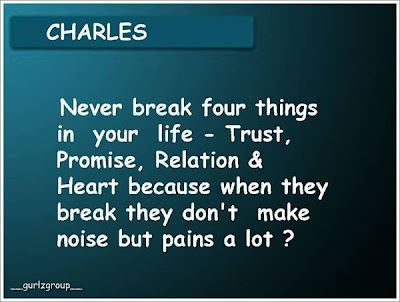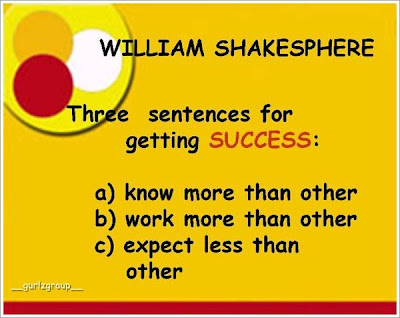Arthur Ashe, the legendary Wimbledon player was dying of AIDS which he got due to infected blood he received during a heart surgery in 1983. Fr om world over, he received letters fr om his fans, one of which conveyed: "Why does GOD have to select you for such a bad disease"? To this Arthur Ashe replied: "The world over -- 50 million children start playing tennis, 5 million learn to play tennis, 500,000 learn professional tennis, 50,000 c om e to the circuit, 5000 reach the grand slam, 50 reach Wimbledon, 4 to semi final, 2 to the finals, when I was holding a cup I never asked GOD 'Why me?'. And today in pain I should not be asking GOD 'Why me?' "
"Happiness keeps you Sweet, Trials keep you Strong, Sorrow keeps you Human, Failure keeps you humble and Success keeps you glowing, but only Faith & Attitude Keeps you going.
The Power of Belief
A businessman was deep in debt and could see no way out.Creditors were closing in on him. Suppliers were demanding payment.He sat on the park bench, head in hands, wondering if anything could save his company from bankruptcy.Suddenly an old man appeared before him."I can see that something is troubling you," he said.After listening to the executive's woes, the old man said, "I believe I can help you."He asked the man his name, wrote out a check,and pushed it into his hand saying, "Take this money.
Meet me here exactly one year from today, and you can pay me back at that time."
Then he turned and disappeared as quickly as he had come.
The business executive saw in his hand a check for $500,000, signed by John D. Rockefeller, then one of the richest men in the world!
"I can erase my money worries in an instant!" he realized.
But instead, the executive decided to put the uncashed check in his safe.
Just knowing it was there might give him the strength to work out a way to save his business, he thought.
With renewed optimism, he negotiated better deals and extended terms of payment.
He closed several big sales. Within a few months, he was out of debt and making money once again.
Exactly one year later, he returned to the park with the uncashed check.At the agreed-upon time, the old man appeared.But just as the executive was about to hand back the check and share his success story, a nurse came running up and grabbed the old man.
"I'm so glad I caught him!" she cried.
"I hope he hasn't been bothering you.
He's always escaping from the rest home and telling people he's John D. Rockefeller."
And she led the old man away by the arm.The astonished executive just stood there, stunned.All year long he'd been wheeling and dealing, buying and selling, convinced he had half a million dollars behind him.Suddenly, he realized that it wasn't the money, real or imagined, that had turned his life around.
It was his newfound self-confidence that gave him the power to achieve anything he went after.
Mastermind success!
You can, if you think you can
Have you heard of Roger Bannister? He was the first athlete to run the mile in less than four minutes.
In doing so, he not only broke the four-minute barrier, but also taught us all a valuable lesson.
Back in the 1950's, the world record - 4 minutes 1.4 seconds - was held by Sweden's Ginder Haegg. The record stood for several years since it was set in 1945. Athletes, experts and the world were convinced that it was impossible to run a mile in less than four minutes. Some even argued that the human body was biologically incapable of running the mile in less than four minutes!
And then, on 6th May, 1954, Roger Bannister did the impossible. He broke the four minute barrier, finishing the race in 3 minutes, 59.4 seconds.
His rival - Charles Landy - had thrice run the mile in less than 4 minutes 2 seconds without breaching the 4 minute mark. The four minute barrier was "like a wall", Landy had said. But guess what? Just 56 days after Bannister's feat, Landy ran the mile in 3 minutes 57.9 seconds. And by 1957, 16 athletes around the world ran the mile in under 4 minutes. The 4 minute mental barrier was truly shattered!
What really happened? Did coaches get smarter and teach the athletes new techniques? Did running shoes get more sophisticated? Did bodies suddenly get stronger? No. The 4 minute barrier it turned out was not a physiological one - just a mental one! As Roger Bannister explained later, it seemed illogical that you could run a mile in 4 minutes and a bit, but not break 4 minutes. His mind refused to accept that barrier. That made all the difference.
Once that mental barrier was broken by Bannister, everyone believed it could be done! And once the belief changed, the rest was easy.
It's important to understand that our achievements in life are limited not by what we can do, but by what we think we can do. More than ability, it's our attitude that makes the difference. As Henry Ford said, "If you think you can, you can. And if you think you can't, you are right".
You will probably find your mind constantly grappling with two competing thoughts: 'I can't!' and 'I can!' How do you ensure the 'I can' wins? How can we break our mental barrier of 'I can't'?
There was a man in Alaska who had a black dog and a white dog. His dog fights attracted large crowds. Every week people would bet on which dog would win. Sometimes the black dog won, and sometimes the white one. One lady noticed that no matter which dog won, the owner always bet on the right dog, and won each week. When the man retired the two dogs, the lady asked him the secret.
"Simple," said the man. "I always bet on the dog I had been feeding all week."
So whether 'I can't' wins in your mind or 'I can', depends on which thought you are feeding!
Feed the 'I can' dog in your mind. The thought you feed, grows! Focus on your strengths, and they will grow. Or keep thinking of your weaknesses and your fears. And unfortunately they'll grow too.
You won't always find a Bannister to break your mental barrier. You need to do it yourself. Once you start feeding the 'I can' thought, you will achieve more than you ever thought was possible!
Obstacles helped these men earn mega success
AT age 10, Julio was a little Spanish boy with a dream. He wanted to play football for his favourite club – Real Madrid! He played all day, practised hard and became a very good goalkeeper.
By the time he was 20, the childhood dream was beginning to come true. He was signed up to play for Real Madrid. And most football pundits were predicting that young Julio would soon become Spain’s No.1 goalkeeper.
One evening in 1963, Julio and his friends set out in a car for a night of fun. It turned out to be a night of horror, as the car they were travelling in met with a terrible accident. And young Julio – soon-to-be star goalkeeper of Real Madrid and Spain – found himself in hospital, paralysed from the waist downwards. Doctors were unsure if he’d ever be able to walk again. They were pretty sure he would never play football again.
The road to recovery was long and painful. Julio spent the night thinking about what might have been. His mind was filled with sorrow, anger, regret. To lessen the pain, he took to writing songs and poems at night, with a tear in his eye and a pen in his hand. And to increase the dexterity in his hand, a nurse gave him a guitar. He had never touched a guitar in his life! But soon Julio began strumming the guitar and also singing the songs that he had been writing.
After being bed-ridden for 18 months, Julio gradually picked up the pieces of his life. Five years after the accident, Julio entered a singing competition – and won the first prize - singing a song called “Life goes on the same!”
He never played football again. But with a guitar in hand and a song on his lips, Julio Iglesias went on to become one of the top ten singers in the history of music, selling over 300 million albums. Just imagine. If not for that accident, Julio Iglesias would have probably been just another goalkeeper in Europe!
What happened to Julio that evening in 1963 could happen to any of us. A setback or an accident – or failure - can often appear to be the end of the road. But it seldom is. When one door shuts, usually another one opens. It’s just that we get so busy staring at the closed door and banging our head against it that we fail to spot the other door opening. Learning to cope with failure is often the first – and most critical step – towards success.
Never let failure impact your sense of self-belief. You are a star, with unique talents. Didn’t clear the entrance exam to engineering college? Maybe you weren’t meant to be an engineer. That’s all.
Even Albert Einstein didn’t clear the entrance exam to join a polytechnic. But he didn’t do too badly, did he? Maybe there is a better, brighter career waiting for you. The trick is to move on and like Julio, tell yourself that “Life goes on the same”.
Several years ago, a bright little boy in a government school in Kerala had a dream. He wanted to be a doctor. He did well in school, and everybody was convinced that this little boy would someday become a fine doctor. He wrote the entrance exam – but failed to make the cut! He was devastated.
His parents were shocked. He went on to do a BSc then a Masters degree, worked with an IT firm – and later went on to found Infosys. His name? Kris Gopalakrishnan, CEO, Infosys. Just imagine. Had Kris not failed the medical entrance, he may have been in some little town in Kerala today, prescribing antibiotics for a runny nose or a nagging flu. Imagine!
Good lesson to learn from Julio. And from Kris. When one door shuts, another one opens. Just believe in yourself. Next time you are faced with a failure or a setback, look out for the other door. Push it open. And go find your place in the sun!
Prakash Iyer is MD, Kimberly-Clark, and executive coach.
 "Lehar Ko Pyar Tha Kinaron Se,
"Lehar Ko Pyar Tha Kinaron Se,







































